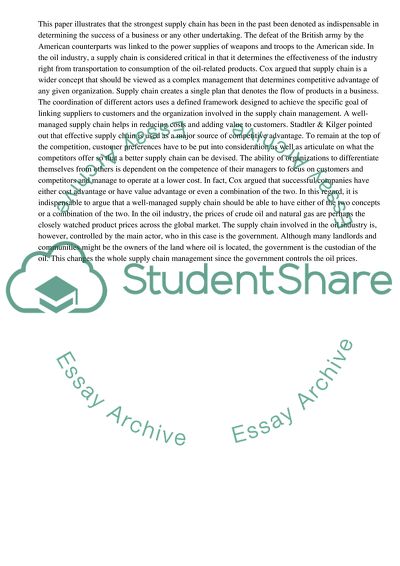Cite this document
(“Supply Chain of Oil Industry Essay Example | Topics and Well Written Essays - 2000 words - 1”, n.d.)
Supply Chain of Oil Industry Essay Example | Topics and Well Written Essays - 2000 words - 1. Retrieved from https://studentshare.org/business/1671743-using-the-analytical-frameworks-examined-in-the-module-scm-gccs-and-gpns-analyze-how-power-relations-shape-and-effect-different-actors-in-a-supply-chain-of-oil-industry
Supply Chain of Oil Industry Essay Example | Topics and Well Written Essays - 2000 words - 1. Retrieved from https://studentshare.org/business/1671743-using-the-analytical-frameworks-examined-in-the-module-scm-gccs-and-gpns-analyze-how-power-relations-shape-and-effect-different-actors-in-a-supply-chain-of-oil-industry
(Supply Chain of Oil Industry Essay Example | Topics and Well Written Essays - 2000 Words - 1)
Supply Chain of Oil Industry Essay Example | Topics and Well Written Essays - 2000 Words - 1. https://studentshare.org/business/1671743-using-the-analytical-frameworks-examined-in-the-module-scm-gccs-and-gpns-analyze-how-power-relations-shape-and-effect-different-actors-in-a-supply-chain-of-oil-industry.
Supply Chain of Oil Industry Essay Example | Topics and Well Written Essays - 2000 Words - 1. https://studentshare.org/business/1671743-using-the-analytical-frameworks-examined-in-the-module-scm-gccs-and-gpns-analyze-how-power-relations-shape-and-effect-different-actors-in-a-supply-chain-of-oil-industry.
“Supply Chain of Oil Industry Essay Example | Topics and Well Written Essays - 2000 Words - 1”, n.d. https://studentshare.org/business/1671743-using-the-analytical-frameworks-examined-in-the-module-scm-gccs-and-gpns-analyze-how-power-relations-shape-and-effect-different-actors-in-a-supply-chain-of-oil-industry.


